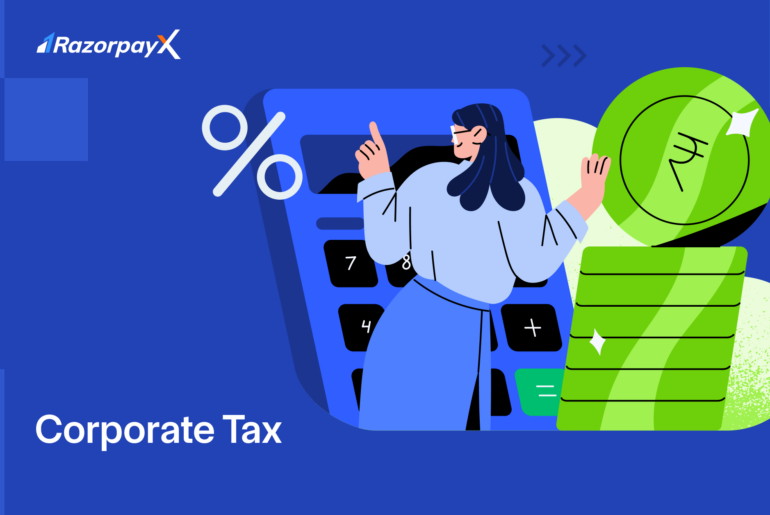Corporate tax accounts for a major share of the Government of India’s revenue. Every business operating in the country pays corporate taxes. If you are a business owner or startup founder looking to learn more about corporate tax in India, here’s a quick read to help you out.
Table of Contents
What is corporate tax?
Corporate tax, as the name suggests is levied on the companies incorporated in India or outside the country under the laws of that particular country. It is imposed on the income or the profits earned by a corporation by the government.
It is meant for businesses including both domestic and multinational companies. The revenue the government generates from corporate tax is significant as it plays a crucial role in the nation’s development.
Update on corporate tax rate: Budget 2024
In the Union Budget 2024, Finance Minister Nirmala Sitharaman announced the reduction in corporate tax of both foreign companies from 40% to 35%.
| Section | Tax Rate |
| First Schedule to Finance Act, 2010: Applicable if the company’s turnover or gross receipts are less than ₹4 billion in the previous year | 25% |
| Section 115BA: The company was established and registered on or after March 1, 2016. It is engaged in manufacturing or production.The company does not claim specified exemptions, incentives, or deductions. | 25% |
| Section 115BAA: The company does not claim any specified exemptions, deductions or incentives. | 22% |
| Section 115BAB: The company is established and registered on or after October 1, 2019. It is engaged in manufacturing or production. Manufacturing commences on or after October 1, 2019, but on or before March 31, 2024. The company does not claim any specified incentives, exemptions or deductions. | 15% |
| First Schedule to Finance Act 2010: Applicable to any other domestic company that does not fall under the specific categories mentioned above. | 30% |
Tax incentives for specific industries
There are specific industries such as green manufacturing companies, investments, and new infrastructure related to it can benefit from a concessional corporate tax rate of 15%. However, these industries should have commenced their production before March 31, 2024 to be eligible for this incentive.
Deductions applicable on corporate tax in India
Corporates can reduce or optimise their taxes by using strategies along with efficient management of deductions, exemptions, and rebates.
The below mentioned deductions are applicable on corporate tax in India:
Capital Gains
Capital gains can be taxed at a flat rate of 12.5% or 20%. It depends on the nature of the gains. However, it can be exempted under sections such as 54D, 54G, 54GA, 54EC.
Donations to Charity
Under Section 80G, any contribution made to eligible charitable organisations can be tax exempted by 50% to 100%.
Enrolment of New Employees
Corporates can claim tax deduction when they hire new employees.
Depreciation Deduction
Under Section 32, companies can claim a 15% tax deduction for depreciation of their old assets. Additionally, companies can also claim a 20% tax deduction on new assets used in the manufacturing or production sector.
Corporate tax rate for a domestic company
The table below displays the applicable corporate tax rate for a domestic company in AY 2021-2022:
| Gross Turnover | Corporate Tax Rate |
| Up to Rs. 400 crore | 25% |
| Exceeding Rs. 400 crore | 30% |
Corporate tax rate for a foreign company
The table below displays the applicable corporate tax rate for a foreign company in AY 2021-2022:
| Income Nature | Corporate Tax Rate |
| Royalties/fees for technical services received by a foreign corporate from GoI/any Indian concern | 50% |
| Other income obtained through Indian operations | 40% |
The Government of India introduced new rates of corporate taxes, which are applicable only to specific companies.
The table below shows the tax rates that are applicable only for certain corporates:
| Type of Company | Corporate Tax Rate | Requirements/Benefits |
| Companies not seeking incentives/exemptions | 22% (earlier 30%) + Applicable Cess & Surcharge. Corporate tax rate effective at 25.17% | Companies don’t have to pay MAT* |
| Corporates seeking incentives/exemptions | Remains unchanged at 30% | MAT rate is reduced to 15% from 18.5% |
| New Manufacturing Companies | 15% (Earlier, it was 25%) | The company should be incorporated before October 2019 and start production before March 2023 |
*Note: MAT = Minimum Alternate Tax. Scroll down for more details.
Surcharge rates on corporate tax
In addition to tax rates, here are the surcharge rates for corporate taxpayers:
| Income range | Surcharge Rate |
| Rs. 1 crore to 10 crore | 7% on the tax calculated for domestic companies / 2% on the tax calculated for foreign companies, based on rates mentioned above |
| Exceeding Rs. 10 crore | 12% on the tax calculated for domestic companies / 5% on the tax calculated for foreign companies, based on rates mentioned above |
Health and education cess
Additionally, a Health and Education Cess that is 4% of the total tax liability + surcharge as mentioned above will be added to the tax payable before such cess.
Minimum Alternate Tax (MAT)
In case the total tax liability of a company for a given assessment period on the total income is under 15% of the book profits after adding surcharge and HEC, then such a company would have to pay Minimum Alternate Tax, a type of token tax monies.
This applies if the company in question has not opted for Section 115BAA or 115BAB.
MAT is charged at 9% plus surcharge and cess per the rates above if the company in question is a unit of an international financial services centre, and earns its revenue only in the form of convertible foreign exchange.
MAT can be carried forward and adjusted against the regular tax liability for up to 10 consecutive years.
Application and Exemption of Minimum Alternate Tax (MAT)
Minimum Alternate Tax applies to all kinds of companies, including foreign companies which have income sources in India.
MAT, however, does have some exceptions. For instance, under Section 115B, any company set up for the business of life insurance will be exempt from MAT.
Further, companies that generate revenue out of a business in shipping will be exempt from paying MAT, as per the provisions under Section 115V-O.
Provisions for corporate tax rebates
Some of the important provisions for corporate tax rebates are as follows
- The IT department allows deductions if a corporate set up new infrastructure or power sources
- Rebates are available for dividends as per applicable terms and conditions
- A deduction is allowed on interest income in certain instances
The IT Department allows certain deductions for exports and new undertakings of a business
Tips for Corporate Tax Planning
Effective tax planning for corporates is necessary to optimise the current tax management system that will gradually enhance the financial efficiency of the company. Listed below are a few tips to help you plan the taxes smoothly:
Explore Tax Deductions Options
Identify the deductions and tax exemptions that are available for your business. By optimising these options, you can reduce the taxable income of your company.
Understand Tax Laws and Regulations
Understand the Income Tax Act 1961, and Companies Act 2013 and get acquainted with the current law and regulations that are specifically applicable to your business.
How to pay corporate tax online?
Trying to figure out how to pay corporate taxes online? Here’s something to give you a boost.
Businesses can make corporate tax payments online through the e-payment facility of the official portal of the I-T Department.
- If you’re paying taxes for your business, you would need the ITNS 280 challan to pay the corporate tax online through the e-payment mode.
- You’d further need to provide essential information in the challan, such as the correct PAN, address, email ID, phone number, and financial and assessment year number.
- Additionally, you’d need to select code 0020 (for corporate tax payment) and then make the payment via net banking.
P.S. Want to pay Advance Tax, GST, and TDS without hopping buggy government portals and typing in your ID, password, and details over and over again?
RazorpayX offers automated solutions for smooth, seamless payments. Moreover, it helps people make advance tax payments on time. It offers a single dashboard for advance tax, GST and TDS to facilitate smooth and seamless payments.
RazorpayX is a full-stack banking suite that supercharges the current accounts which enables:
- Business Banking+ with end-to-end automation with powerful features like Automated Accounting, OTP management, Maker-Checker Flows
- Automated Vendor Payments
- Payroll – India’s ONLY payroll with Full compliance automation, Employee Insurance management and TDS filing)
With platforms like RazorpayX, you can supercharge and power your business banking like never before.
Frequently Asked Questions
What is Minimum Alternate Tax or MAT?
The Government of India introduced MAT (Minimum Alternate Tax) to address the gap between income calculation and book profits. Many companies make huge profits. They pay dividends to their shareholders. But they use deductions and exemptions of IT Act and pay minimum to no tax. Now, as per the mandate of IT Act, these companies must pay a certain percentage of their profits as MAT. It is applicable for all companies operating in India.
What is Dividend Distribution Tax or DDT?
Corporates had to pay taxes for distributing dividends among their shareholders. This tax is referred to as dividend distribution tax. Do note, DDT or dividend distribution tax has been abolished now.
How much is corporate tax in India?
Corporate tax in India is different for domestic and foreign companies. For AY 2024-25, applicable corporate tax rate for domestic companies is 25% and foreign companies is 35%. Earlier, the corporate tax on foreign companies was 40%, which was reduced in the Union Budget 2024.
How is tax calculated for a business?
Taxable income is determined by subtracting business expenses from the total revenue for the particular financial year.
Why is corporate tax in India reduced?
The Finance Ministry reduced the corporate tax in India to promote growth and investment with an aim to cope up with the ailing economy.
Is corporate tax direct or indirect?
Corporate tax is a direct tax that is levied by the Union Government



